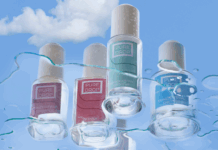LVMH Recherche and Integrated Biosciences, a Californian biotech company, have announced a strategic research partnership aimed at discovering new chemical entities targeting aging at the molecular level. This multi-year partnership will leverage Integrated Biosciences' synthetic biology and artificial intelligence (AI) platform.
Thanks to the combination of its proprietary AI and optogenetics platforms, Integrated Biosciences says it is able to train state-of-the-art deep learning models to virtually screen hundreds of thousands of molecules, identifying the most promising first-in-class chemical compounds that potently modulate age-related biological phenotypes.
Founded by scientists from MIT, Harvard University and UC Santa Barbara, and having recently announced a fundraising round led by Sutter Hill Ventures, Integrated Biosciences says it is known for being at the forefront of AI-driven discovery of novel senolytic compounds - anti-aging chemical entities that selectively eliminate pathological "zombie" senescent cells.
"Our partnership with Integrated Biosciences perfectly embodies our vision: to push back the frontiers of scientific discovery, fueling transformative innovations in beauty, said Bruno Bavouzet, President of LVMH Recherche. This is a unique opportunity to evaluate thousands of potential bioactives simultaneously, revolutionizing the pace of our research for the benefit of all our brands, including our flagship es Christian Dior. By combining our expertise in skin research with their research on AI and aging, we are taking a decisive step forward in the understanding and molecular treatment of age-related cellular pathways."
"This collaboration with LVMH Recherche, a world leader in the research and development of luxury consumer products, represents a significant step forward in our shared commitment to fighting ageing through cutting-edge science, said Felix Wong, co-founder and CEO of Integrated Biosciences. We are delighted to integrate our proprietary technology platform with LVMH Recherche's scientific programs, leveraging our ability to control biological stress responses to develop new targeted bioactive molecules. Our combined efforts can lead to biologically functional products that could transform the way people age."








